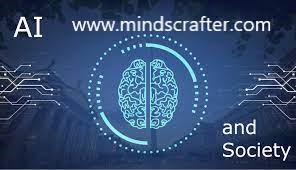
AI Impact on Society
The Future of AI: Predictions and Possibilities for Society
Artificial Intelligence (AI) has profoundly impacted society, revolutionizing various sectors and transforming how we live, work, and interact. AI has become integral to our daily lives, from healthcare and transportation to education and entertainment. It has enhanced the efficiency and accuracy of processes, enabled personalized experiences, and improved decision-making. However, as AI advances, it is crucial to address the ethical considerations and potential challenges associated with its implementation. Balancing the benefits of AI with ensuring privacy, fairness, and transparency is essential to harness its full potential and create a positive and inclusive AI-powered society.
Artificial Intelligence (AI) has rapidly transformed from a futuristic concept to a tangible reality, and its potential is limitless. As AI continues to advance and become more integrated into our daily lives, many individuals and experts are left wondering about the future of AI. Will it create a utopian society where tasks are automated, and life is made more accessible, or will it create a dystopian future where robots replace human workers and control our lives?
This short article will explore the predictions and possibilities for society as AI continues to grow and evolve. From ethical concerns to technological advancements, we will examine how AI will change our society and what we can expect in the years to come. So, read this article, delve into AI’s exciting and ever-evolving world, and explore the future.
What is AI?
Artificial Intelligence (AI) refers to developing computer systems that can perform tasks that usually require human intelligence, such as visual perception, speech recognition, decision-making, and language translation. AI is divided into narrow or weak AI and general or strong AI. Narrow AI is designed to perform specific tasks, while general AI is designed to perform any intellectual task a human can do. AI is based on the idea that a machine can be designed to think and learn like a human.
AI is used in various industries, including healthcare, finance, and manufacturing. For example, AI can analyze medical data and diagnose diseases in healthcare. In finance, AI can detect fraud and make investment decisions. In manufacturing, AI can optimize production processes and improve quality control.
The History and Evolution of AI:
The concept of AI has been around since the 1950s. 1956 the term “artificial intelligence” was coined at the Dartmouth Conference. The first AI program was developed in 1951 by Christopher Strachey, who created a checkers-playing program. Back in 1960s, AI research focused on developing expert systems that could perform tasks that required human expertise. In the 1970s, AI research shifted towards natural language processing and robotics.
In the 1980s and 1990s, AI research focused on machine learning and neural networks. Machine learning is a type of AI that allows machines to learn from data without being explicitly programmed. Neural networks are a type of machine learning that is modelled after the human brain. In the early 2000s, AI research shifted towards deep learning, which involves using neural networks with multiple layers.
AI Applications In Society:
AI is used in various applications, including natural language processing, image recognition, and autonomous vehicles. Natural language processing is used to analyze and understand human language. Image recognition is used to identify objects in images and videos. Autonomous cars use AI to navigate roads and avoid obstacles.
AI is also used in chatbots, virtual assistants, and recommendation systems. Chatbots are computer programs that simulate human conversation. Virtual assistants like Siri and Alexa use AI to understand and respond to voice commands. Recommendation systems use AI to recommend products or services based on user data.
The benefits of AI:
AI has many benefits, including increased efficiency, accuracy, and cost savings. AI can perform tasks faster and more accurately than humans. For example, in healthcare, AI can analyze medical data and assist in diagnosing diseases. In finance, AI can detect fraud and make investment decisions. In manufacturing, AI can optimize production processes and improve quality control.
AI also has the potential to improve our daily lives. For example, virtual assistants can help us manage our schedules and provide us with information. Autonomous vehicles can reduce accidents and traffic congestion. Artificial Intelligence can also improve the accessibility of products and services for people with disabilities.
The potential risks and ethical concerns of AI:
AI also has potential risks and ethical concerns. The rapid advancement of Artificial Intelligence has raised concerns about job displacement and its impact on the workforce. AI can replace human workers in various industries, leading to job losses and economic inequality.
Artificial Intelligence also raises ethical concerns about privacy and surveillance. Artificial Intelligence can be used to collect and analyze personal data, which raises concerns about data privacy. AI can also be used in surveillance systems, which raises concerns about civil liberties and government control.
Another ethical concern is AI bias. Artificial Intelligence systems can be biased towards certain groups or individuals, leading to discrimination and injustice. For example, facial recognition technology has been shown to have a higher error rate for people of colour and women.
Predictions for the Future of AI:
The future of AI is uncertain, but there are several predictions about how it will evolve. Some experts predict that AI will become more integrated into our daily lives, with virtual assistants and autonomous vehicles becoming more common. Other experts predict that AI will lead to job displacement and economic inequality.
Another prediction is that AI will become more human-like. General AI, which can perform any intellectual task a human can do, is still in the early stages of development. However, some experts predict that general AI will become a reality, leading to machines that can think and learn like humans.
The Impact of AI on Industries and jobs:
AI already impacts various industries, including healthcare, finance, and manufacturing. AI is being used to improve efficiency, accuracy, and cost savings. However, AI also has the potential to replace human workers in various industries, leading to job losses and economic inequality.
AI also creates new job opportunities in data science and AI development. However, these jobs require specialized skills and education, which can lead to a skills gap and societal inequities.
AI and the environment:
Artificial Intelligence also has the potential to address environmental challenges, such as climate change and resource depletion. Artificial Intelligence can optimize energy usage, reduce waste, and improve sustainability. For example, Artificial Intelligence can optimize transportation systems, reducing traffic congestion and emissions.
However, AI also has the potential to increase energy usage and contribute to environmental degradation. The energy consumption of AI systems, particularly those that require large amounts of data processing, can be significant. AI can also contribute to e-waste, as the rapid pace of technological advancement leads to the disposal of older machines.
The Role of Government and Regulation in AI:
The rapid advancement of AI has raised concerns about the role of government and regulation. Some experts argue that AI should be regulated to address ethical concerns and prevent potential harm. Others say that regulation could stifle innovation and hinder the potential benefits of AI.
Several countries have already established guidelines or regulations for AI, including the European Union and China. The European Union has proposed rules requiring AI systems to be transparent, accountable, and non-discriminatory. China plans to become a world leader in AI by 2030, focusing on AI development and regulation.
Conclusion: Embracing the possibilities of AI while mitigating the risks:
The future of AI is uncertain, but AI will continue to transform our society. AI can bring significant benefits, including increased efficiency, accuracy, and cost savings. However, AI has potential risks and ethical cons, including job displacement, privacy concerns, and bias.
To ensure that AI benefits society, it is essential to mitigate the risks and mitigating the risks and addressing ethical concerns is vital for education and research. AI development should be transparent, accountable, and non-discriminatory. It is essential to embrace the possibilities of AI essential, recognizing and mitigating the risks.
